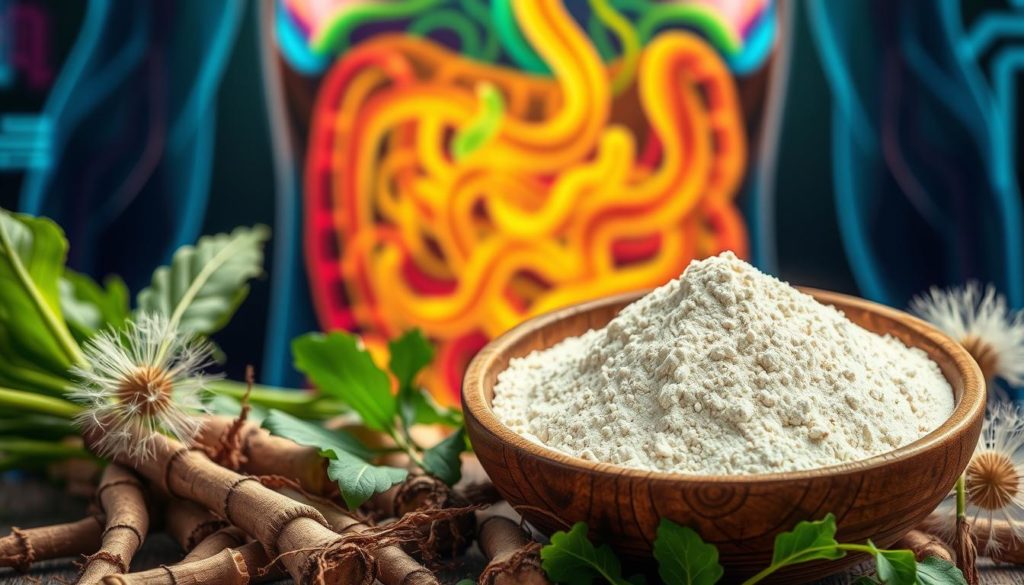Did you know nearly 90% of Americans don’t get enough dietary fiber? It’s crucial to add fibers like inulin to our diets. Inulin is famous for its prebiotic benefits, improving our digestive health. You can find it in many natural supplements.
Inulin does more than just up your fiber count. It helps good gut bacteria thrive and improves digestion. More people are turning to natural supplements with inulin. This shows how important it is for our gut health.
What is Inulin?
Inulin is a dietary fiber and a natural prebiotic. It helps our gut health by feeding good bacteria. It mostly comes from chicory root fiber. What does it do, and how do we get it? Let’s explore further.

The Basics of Inulin
Inulin is a natural prebiotic fiber. It feeds the beneficial bacteria in our gut but we can’t digest it. It’s found in various plants and supports a healthy digestive system.
Inulin doesn’t get digested in the upper gastrointestinal tract. So, it reaches the colon and gets fermented by bacteria there. This fermentation makes compounds that boost digestion and health.
How Inulin is Extracted
Inulin mainly comes from chicory root. Yet, it’s also in foods like Jerusalem artichoke, garlic, and onions. Extracting it involves many steps to keep it pure and useful.
- Harvesting: Chicory roots are harvested with care.
- Cleaning: They’re washed well to remove soil.
- Extraction: Hot water pulls inulin from the roots.
- Purification: Then, inulin is filtered and cleaned further.
- Drying: The inulin is dried into a fine powder.
This careful process keeps inulin’s health benefits. It gives us a powerful natural prebiotic to boost gut health and overall wellness.
Inulin Benefits for Gut Health
Inulin is a type of prebiotic fiber known for its health benefits. It plays a big part in improving gut health. Impacting the gut’s good bacteria, inulin helps keep your digestive system healthy and strong.

Improving Digestion
Inulin makes digestion smoother by increasing stool bulk and frequency. It helps move waste through your gut more easily. This helps prevent constipation, making your digestive system more efficient.
Research shows inulin can reduce symptoms of irritable bowel syndrome (IBS). It makes digestion better for many people.
Supporting Beneficial Bacteria
Inulin is key in helping good bacteria grow in the gut. It feeds probiotics like Bifidobacteria and Lactobacilli. This relationship makes your microbiome healthy and strong.
Studies show that inulin not only helps with digestion but also boosts your immune system. It creates a better environment in your gut. This is why inulin is vital for gut health.
The Science Behind Inulin as a Prebiotic
Recent prebiotic fiber research highlights inulin’s role in boosting gut health. Nutritionists and scientists are diving deep into the benefits of inulin through many scientific studies on inulin. They find that inulin, a prebiotic fiber naturally found in plants, greatly benefits the digestive system.
In clinical research, inulin has been shown to help good gut bacteria grow. Acting as food for probiotics, it helps increase these beneficial microbes. Many scientific studies on inulin show it can improve the makeup of our gut flora.
Below is a table that outlines some major findings of recent prebiotic fiber research. It focuses on the benefits of inulin:
| Study | Key Findings | Health Impact |
|---|---|---|
| Study A | Increase in Bifidobacteria | Enhanced digestive health |
| Study B | Reduced gut inflammation | Relief from IBS symptoms |
| Study C | Improved mineral absorption | Better bone health |
The global community is paying more attention to prebiotic fiber research as we learn about inulin’s health benefits. The vast amount of scientific studies on inulin suggests a bright future for its use in diets and health plans.
Common Food Sources of Inulin
Adding inulin to your diet is easy and tasty if you choose the right foods. You can pick from inulin-rich foods for their prebiotic effects. Or select high-fiber veggies and fruits to boost your gut health. There are many options available.
Vegetables Rich in Inulin
Vegetables are top sources of inulin. By including these high-fiber veggies in your diet, you can support your digestive system:
- Chicory Root: This is one of the top foods rich in inulin and can be used in place of coffee.
- Jerusalem Artichokes: Known as sunchokes, these have a lot of inulin.
- Garlic: This tasty and adaptable veggie is also a good source of inulin.
- Onions: Both the sweet and sharp types are filled with inulin.
- Leeks: They are an excellent addition to soups and stews.
Fruits Containing Inulin
Inulin can also be found in some fruits, adding sweetness and health benefits to your diet:
- Bananas: Especially those that are a bit green are high in inulin.
- Apples: Common fruits that have a good amount of inulin, especially with the skin on.
By incorporating these inulin-rich foods into your meals, you can greatly improve your gut health. With a wide range of high-fiber veggies and fruits available, you can enjoy better digestion and overall health.
| Food Sources | Inulin Content (g per 100g) |
|---|---|
| Chicory Root | 15-20 g |
| Jerusalem Artichokes | 16-18 g |
| Garlic | 9-16 g |
| Onions | 1-8 g |
| Leeks | 3-10 g |
| Bananas | 0.3-0.7 g |
| Apples | 0.5-1.5 g |
Inulin Powder: A Convenient Source
Inulin powder is a great way to add healthy fiber to your diet easily. You can mix this powder into many meals and drinks without much trouble. This makes it a super handy supplement.
Prebiotic powders like inulin boost your digestive health in a simple way. You can add them to your smoothies, coffee, or yogurt. This flexibility is perfect for those who want to enhance their diet without big changes.
Here’s a quick look at how inulin powder can fit into your diet smoothly:
| Usage | Benefits |
|---|---|
| Adding to Smoothies | Enhances fiber content while maintaining taste |
| Stirring into Coffee | Boosts digestive health without altering flavor |
| Mixing with Yogurt | Supports beneficial bacteria with a creamy texture |
Inulin powder’s ease of use and versatility make it a top choice for dietary supplements. It suits everyone, from the busiest people to those focusing on gut health. Prebiotic powders provide convenience and notable health benefits.
Inulin Supplements: Are They Worth It?
Inulin supplements are getting a lot of buzz for their gut health benefits. There are many types of inulin supplements. It’s key to know which type to choose, how to use them safely, and about their side effects.
Types of Inulin Supplements
Inulin comes in various forms like powder, capsules, and chewable tablets. Think about what works best for you. For example, powders mix well in smoothies, while capsules are easy and clean to take.
How to Use Inulin Supplements Safely
Begin with a small dose and slowly increase it. This can help to reduce any side effects like bloating. For those with sensitive stomachs or FODMAP intolerance, this is especially important. Always talk to a doctor before adding inulin to your diet.
Potential Side Effects
Most people handle inulin supplements well, but some might experience gas or bloating. To avoid these issues, stick to the advised doses and listen to your body. For deeper insights, look at this informative article.
Comparing inulin’s benefits and downsides helps you decide if it fits your diet. Knowing the types, how to use them safely, and potential side effects allows you to choose wisely. This helps you benefit from inulin without unwanted surprises.
The Role of Inulin in a Balanced Diet
Inulin can greatly improve your health. It’s a prebiotic fiber that boosts gut health and aids digestion. Knowing how inulin fits within your fiber intake is key.
Daily Recommendations
Health experts advise taking 3-10 grams of inulin daily. This can be done by eating inulin-rich foods like chicory root, Jerusalem artichokes, and garlic. Including the right amount of inulin supports good digestion and a healthy gut.
Combining Inulin with Other Fibers
For best gut health, mix inulin with different dietary fibers. A diet with soluble and insoluble fibers benefits your gut. Here are ways to do this:
- Mix inulin powder into smoothies with fruits high in soluble fiber like apples and bananas.
- Add inulin to baked goods with whole grains for both types of fibers.
- Include fiber-packed veggies like broccoli and carrots in meals with inulin-rich foods.
This method ensures you get a good mix of fibers, promoting digestive health and overall wellness.
Inulin and Weight Management
People are looking into inulin for weight management. It’s good at controlling hunger and boosting metabolic health. Let’s explore how inulin aids in weight control by managing hunger and enhancing metabolism.
Appetite Regulation
Inulin is key to controlling hunger. It works with gut hormones to manage appetite. Studies show inulin reduces the hunger hormone ghrelin and raises peptide YY, making you feel full. This balance helps cut down on eating, which is great for managing weight.
Metabolic Health Benefits
Inulin is great for metabolic health too. It improves insulin sensitivity, keeping blood sugar levels in check. Better insulin sensitivity helps prevent diabetes. Also, inulin impacts gut bacteria positively, helping metabolism. This makes inulin a strong ally for improving metabolic health and weight loss.
| Health Aspect | Impact of Inulin | Key Benefits |
|---|---|---|
| Appetite Control | Regulates ghrelin and peptide YY | Reduces hunger and increases satiety |
| Metabolic Health | Enhances insulin sensitivity | Prevents type 2 diabetes and supports gut health |
Conclusion: Why Inulin is Essential for Gut Health
Inulin’s role in gut health is key. It helps our good gut bacteria thrive. This makes digestion easier and nutrient uptake better.
We talked about inulin’s perks, like better digestion and a healthy gut community. We also looked at where you can get inulin. This includes veggies, fruits, and supplements. Each shows how vital inulin is for our diets.
Adding inulin to our meals is easy. It helps keep our gut in top shape. Knowing how good inulin is for us, we can enjoy better health for a long time.
FAQ
What is inulin?
Inulin is a dietary fiber and natural prebiotic. It’s found in foods like chicory root, garlic, and onions. Inulin helps with healthy gut flora and aids in digestion.
What are the benefits of inulin for gut health?
Inulin improves digestion and supports good bacteria growth. It also helps balance the gut microbiome.
How is inulin extracted?
Inulin comes from chicory root. The process involves cleaning, slicing, and soaking the roots in hot water. After soaking, the inulin is separated, purified, and dried into powder.
Can you get inulin from food sources?
Yes, inulin is in high-fiber vegetables and fruits. Asparagus, leeks, Jerusalem artichokes, and bananas are good sources.
What is inulin powder?
Inulin powder is a dietary supplement made from inulin. It’s used to add prebiotic fiber to foods and drinks. This boosts fiber intake easily.
Are inulin supplements worth taking?
Inulin supplements help increase fiber in your diet. They’re useful if your diet lacks fiber. But, be mindful of how to use them and possible side effects.
How do you use inulin supplements safely?
Begin with a small dose of inulin supplements. Increase slowly to prevent discomfort. Follow what the maker suggests and talk to a doctor if needed.
What are some potential side effects of inulin?
Starting inulin might cause gas, bloating, or stomach upset. These issues often go away as you adjust to more fiber.
How much inulin should you take daily?
The right amount of inulin varies. Usually, 3-10 grams daily is good for the gut. Start with less and slowly add more.
Can inulin help with weight management?
Yes, inulin supports weight management. It helps you feel full and boosts metabolism. This can help manage appetite and cut calories.


